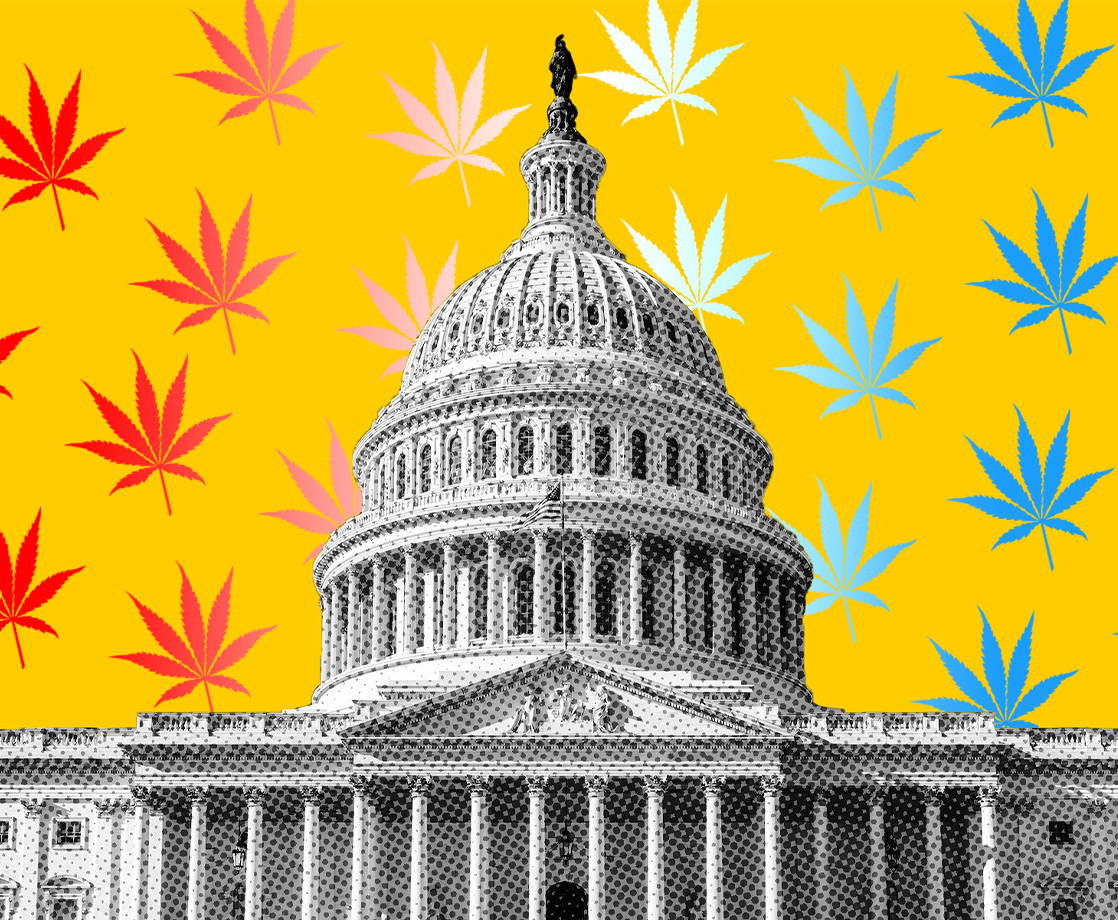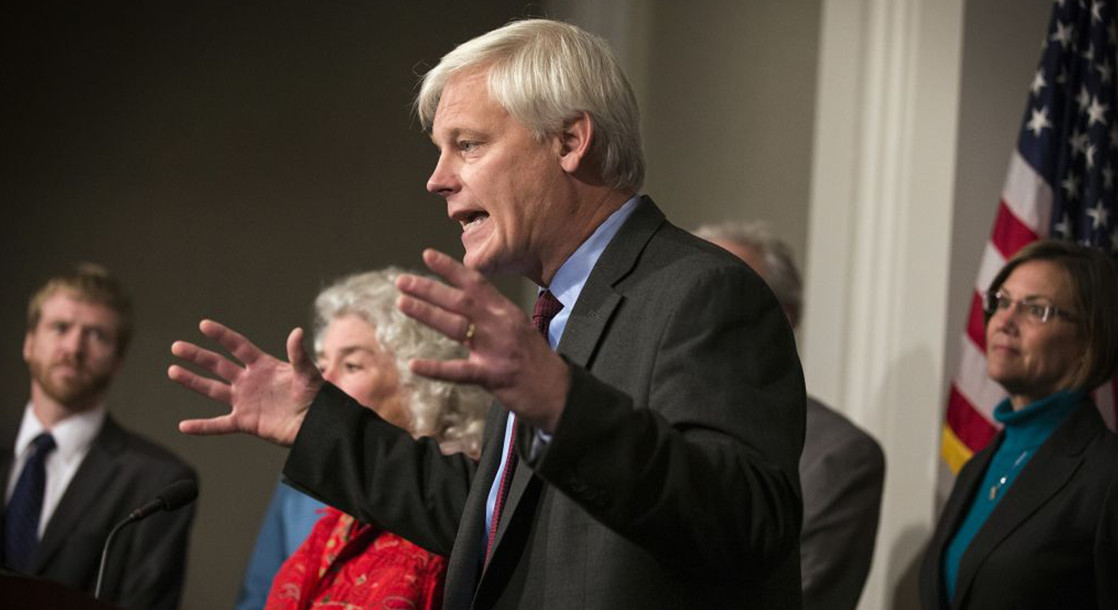The Republican Party’s biggest proponent of criminal justice reform ended his presidential campaign on Wednesday. Rand Paul, 53, finished the Iowa caucus with just 4.5% of the vote. The Republican senator from Kentucky endorsed the Libertarian candidate for President, Gary Johnson.
Mr. Paul gained a reputation for bringing together individuals from both parties on issues like criminal justice reform. In pursuit of the youth vote, Paul often visited college campuses – places from which Republicans generally shy.
Paul is as liberal as any politician you’re going to get on the topic of marijuana. When you hear him speak on it, he sounds more like President Barack Obama or Bernie Sanders than Ted Cruz or Donald Trump. The issue for Paul is about state’s rights and patient’s rights. A proponent of a limited federal government, he believes states should set their own marijuana policies.
In the Senate, he is a sponsor of the CARERS Act, a “historical” bill supportive and protective of patient protections for medical use of marijuana. He also introduced The Industrial Hemp Farming Act, a reflection of his belief that hemp legalization is an environmental issue and could create jobs. Both of the bills are bipartisan. His position on the issue is in line with the nearly 60% of Americans who support legalization. Paul sounds like President Barack Obama on the issue.
“There’s no doubt our criminal justice system generally is so heavily skewed towards cracking down on nonviolent drug offenders that it has not just had a terribly effect on many communities, particularly communities of color, rendering a lot of folks unemployable because they got felony records and disproportionate prison sentences,” Obama told VICE’s Shane Smith in 2015. “We may actually be able to make some progress on the decriminalization side at a certain point and if enough states end up decriminalizing, Congress may then reschedule marijuana.”
During his Presidential campaign, when Paul was not calling out Jeb Bush for having admitted to smoking marijuana in his youth while opposing medical marijuana bills in Florida, you’ll see his position is quite similar to the President’s.
“…The people who are going to jail for this are poor people, often African Americans and hispanics, [while] the rich kids who use drugs aren’t,” Paul said in a recent Republican debate. “I think this is a crime where the only victim is the individual, and America has to take a different attitude. I’d like to see more rehabilitation and less incarceration. I think the federal government has gone too far. The War on Drugs has had a racial outcome and really damaged our inner cities.”
Paul is a “a big fan of the drug courts” which steer the nonviolent offenders towards work and away from incarceration. By moving away from incarceration of nonviolent offenders, Paul believes, you can then keep violent offenders incarcerated for their full sentences. He sometimes jokes that, with current drug laws, you can kill somebody in Kentucky and get out sooner than for marijuana offenses. In debates, Paul did well when the issue of marijuana arose. He generally took the opportunity to lament federal government overreach.
He oft evoked in debates and media a child he knows who suffers 200 seizures-a-day, and for whom cannabis oil helps where nine traditional methods have failed. He upbraided his political opponents along the campaign trail for believing this child should be taken away from his parents and his parents thrown in jail. Paul has long been outspoken on how the Republican Party could capture the youth vote through reform-minded stances on issues like marijuana.
As demonstrated in The Industrial Hemp Farming Act, Paul advocates in the Senate not only for the decriminalization of marijuana, but also for the legalization of hemp: “One of the things that fascinates me about hemp, making clothes is one thing, rope is another thing, but really what fascinates me is the possibility of making paper out of it,” he told a California radio station in 2012. “I think this is an environmental issue. You can grow one acre of hemp in one season and it’s the equivalent of two acres of trees grown over fifteen years.”
Paul’s views on marijuana likely stem from the fact that he is his father’s child. His father, the classical libertarian Senator from Texas, Ron Paul, was known as Dr. No thanks to how often he cast a ‘No’ vote as Senator to block new laws and regulations.
Paul the elder believed in an end to marijuana prohibition while he served as Texas Senator. He believed the states should regulate cannabis like alcohol, and claimed he was no radical, instead simply wishing to go back to the way things were in 1937, when power rested with the states to regulate marijuana.
“The war against marijuana causes so much hardship and accomplishes nothing,” he once said. Both father and son insist they do not promote drug use, but simply oppose the criminalization of drugs. Rand Paul’s position differs markedly from the Republican candidates still campaigning.
Ted Cruz, who received 27.7% of the vote in Iowa and finished first, has criticized President Obama for not enforcing federal marijuana laws in Colorado and Washington after voters in those states chose to regulate and tax marijuana like alcohol. Donald Trump, who received 24.3% of the vote in Iowa and finished second, said he opposes recreational marijuana legalization during a recent Republican debate. “I feel strongly about that,” he told Fox News host Sean Hannity. Trump believes medical should be legalized, and that overall the issue should be left to the states to decide. In 1990, Trump said he favored the legalization of all drugs.
“There are few people in the entire US Congress who compare,” John Hudak, senior fellow for Brookings, wrote.
Hunter White, the 24-year-old Republicans Against Marijuana Prohibition (RAMP) Communications Director, also believes Paul was the best Republican candidate on the issue, noting his classical libertarian stance: “He acknowledges medical science,” White added.
Arizona lawyer Marc J Victor, who once ran for the Arizona Senate as a Libertarian, has personally met Rand Paul and supports him for President. He’s also represented hundreds, if not thousands, of clients for marijuana related clients.
“Paul is the only rational choice for anyone into freedom and who understands the War on Drugs has been one of the worst mistakes our country has ever made in terms of freedom for other Americans,” Victor told me over phone before Paul dropped out of the race.
“Instead of seeing it only as a patient’s right’s issue, he sees it also as a fundamental freedom issue,” the criminal defense attorney said. Even in San Francisco, support of Paul’s stance is easy to find amongst cannabis law experts.
“[Paul] is the most forward thinking candidate on marijuana, both recreationally and as medicine,” Kenneth Wine, of Hallinan & Wine law firm in San Francisco, told me last week. Wine said Paul was the one candidate who understood that the American people do not want to continue the “cycle of endless incarceration” for people who use marijuana recreationally, and in particularly those who use it medicinally.
“As far as turning the tide away from imprisonment and towards rehabilitation, Paul [has been] ahead of the curve in both parties,” he added.
In Washington D.C., the Marijuana Policy Project (MPP) gave Paul an “A-” for his marijuana stance before the Kentucky Senator ended his presidential campaign. Paul’s campaign could end up leaving a lasting impression on the Republican Party.
Robert Capecchi, Director of Federal Policies at MPP, thinks Paul’s candidacy forced the Republican Party to rethink its marijuana stance. He also believes that the fact candidates for President take reasonable positions on marijuana policy reform “acts as validation for the voter who already supports ending marijuana prohibition.” Paul is a big part of the puzzle.
“Paul's platform on marijuana policy is just one more piece of evidence that support for sensible reform isn't a partisan issue,” he told MERRY JANE. “Democrats, Republicans, Independents, et cetera, we find pockets of support for marijuana policy reform in all parties.”
Paul brings his cannabis views to an upcoming Senate re-election campaign in Kentucky this year. He will likely also continue espousing the importance of criminal justice reform.
“Should we give people second chances? I believe in second chances.”











